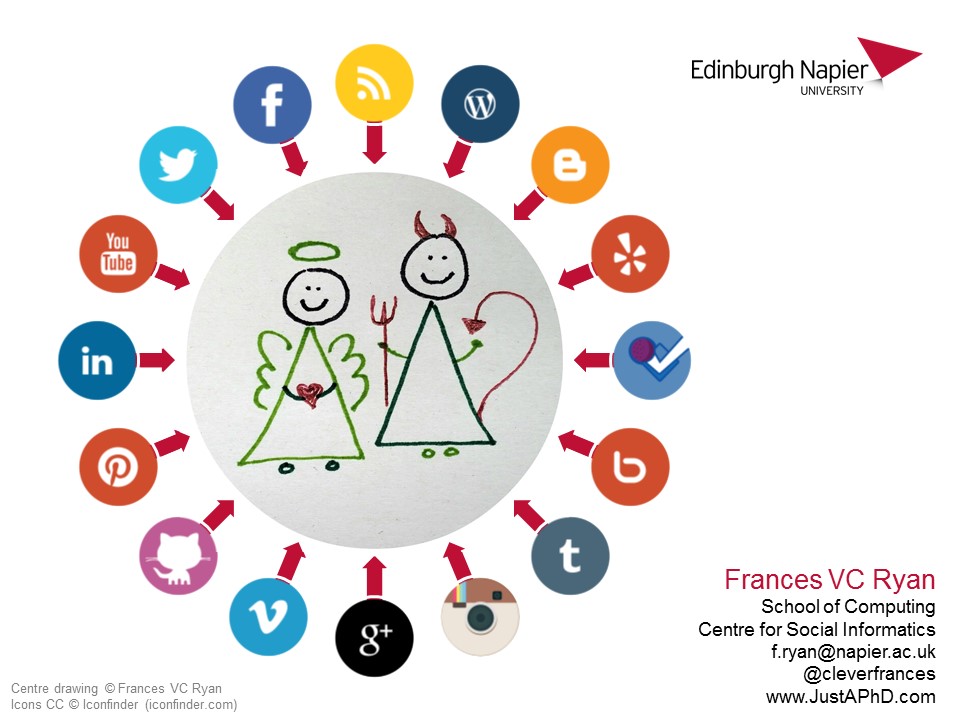Last week I had the privilege of presenting my PhD research at the Edinburgh Napier University Research Conference in the form of a Three Minute Thesis. I had been put forward for the competition because I was the first-place winner at the School of Computing’s PhD Conference the month before, and I was excited about the opportunity to present my work in a short, upbeat manner.
The Three-Minute Thesis is an international competition where PhD students have three minutes to explain their research to a general, non-academic audience. Presenters are allowed to use one static slide for their talk but are not allowed props, costumes, or anything else to aid in their talk. It is one person, one slide, and three minutes. Not a second more.
I was one of two presenters from the School of Computing, along with Marwa Salayma, and one of 11 PhD presenters in total. I went into it all with a bit of confidence, especially because I know that I am generally rather decent at giving presentations. However, the moment the session began, I realised how extremely well-polished and, well, better the other 10 presenters were. And that’s when I knew there was no way I would be winning either the judges’ decision or the popular vote. And that was totally OK with me because the others were just better.
So, where did I go wrong?
First of all, the time limit for the three-minute thesis is very strict, with instant disqualification if you speak for even one second past your three-minute allowance. And this meant that I was extremely nervous because I do tend to ad-lib and joke a bit when I’m presenting, or when I’m just having a normal conversation! That pressure meant that I was extremely nervous in the lead-up to presenting. (A little bit of nervousness is good. But I had more than a little. Which is bad!)
I had practised a fair amount beforehand, but my changing script meant that I wasn’t completely confident about what line came next. And so, as I often do, I ad-libbed in a wee bit of text which meant that I had to wrap up my last comment in warp-speed, but I did manage to end spot-on the three-minute mark.
Of course, one of my larger failings was that I spent too much time setting things up and not enough time sharing my research findings. I was trying to weave a story and build a connection with the audience, but I did so to the detriment of the “interesting bits” of my research.
So, what would I do differently next time?
First of all, I will try to get out of it! I don’t think I like the strict structure of a three-minute thesis. But if I couldn’t get out of it, I would just work on my script a bit more, trying to focus more on the interesting bits rather than laying the groundwork for a larger story. I would also practise a lot more, and make sure that I was not at risk of talking up to the wire.
So, I failed. Miserably.
Yes, miserably. (I’m sure others would say I did a good job, but I am my own worst critic.) But my failure doesn’t mean that the experience was a failure. In fact, I would argue that the experience was a success because I learned a lot from it and I will improve my skills because of it.
So, who did win?
Matthew Wale won the popular vote for his talk about the effect of noise on marine life and David Whiteley won the judges’ choice for his talk on hepatitis research. David will now go on to present at the UK semi-finals and I wish him all the best. Both Matthew and David (and the rest of the presenters!) did an amazing job and I am in awe of their skills. Truly.
Don’t worry though, I didn’t leave the conference empty-handed. But that’s a story for another day, as I slowly work to catch up on my blog. (And my PhD!)
